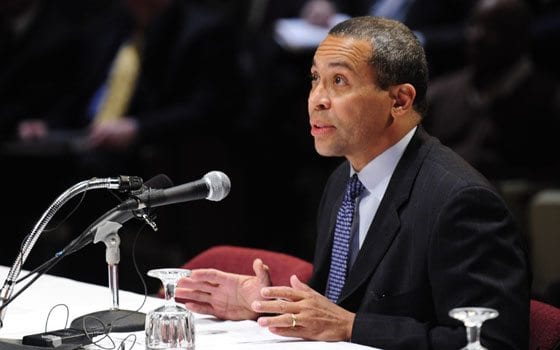
Gov. Deval Patrick isn’t just lobbying lawmakers in their State House offices as he tries to build support for a comprehensive transportation overhaul. He’s also hitting the road to endorse the regional benefits of his plan.
Patrick has met with elected officials, editorial boards and the public in cities across Massachusetts, including Worcester, Springfield, Fall River and Lowell, to discuss the benefits of a 19-cent increase in the state’s gasoline tax.
He wants to commit 6 cents of the proposed tax increase to road, bridge, transit and rail projects outside Boston, and mandate that at least 75 cents of every future gas tax dollar be used for transportation projects in the region in which it is paid.
Right now, there’s no such requirement, driving the perception that regional dollars would get funneled to Boston-area projects such as the nearly $15 billion Big Dig.
Yet the sales pitch also has a more practical goal that Patrick acknowledges: It would help cobble him together the majorities needed to pass the bill through the state Legislature.
“There’s no doubt about it,” Patrick said last Friday, referring to the reality of geographical politics. “But it’s also a practical fact and a matter of sort of regional fairness that we try to assure that we’re dealing with needs all over the state.”
Patrick’s plan calls for streamlining the state’s transportation bureaucracy, eliminating the Massachusetts Turnpike Authority and resolving nettlesome issues such as higher pension benefits paid to members of the Massachusetts Bay Transportation Authority (MBTA) in comparison with other state workers.
But the proposal that has triggered the most public outcry is the 19-cent gas tax increase, which would boost the state’s tax to 42.5 cents per gallon — the highest in the nation. The plan also calls for indexing the tax to inflation, all but assuring future incremental increases.
Lawmakers and drivers argue that the transportation system should be reformed before any more revenue is pumped into it. Patrick and his transportation secretary, James Aloisi, have argued that both can be accomplished at the same time.
They have also highlighted the breakdown of the proposed tax increase: 6 cents to help pay off bonds and prevent a fare increase at the MBTA, which has an $8 billion debt; 4 cents to prevent the toll increase at the Turnpike, which itself is $2.2 billion in debt; 2 cents to end the practice of paying some Highway Department salaries with bond money; and 1 cent for “innovative gas and toll solutions,” such as expanded electronic tolling and discounts for driving fuel-efficient vehicles.
The remaining 6 cents would be devoted to regional needs: 3 cents for rail projects outside Boston; 1.5 cents to restructure funding for Regional Transit authorities; and 1.5 cents for road and bridge projects outside Boston.
The rail projects, for example, include a partnership with Connecticut to link Hartford and Springfield, Mass.; a South Coast rail line to Taunton, New Bedford and Fall River; and a possible extension of northern commuter rail lines into New Hampshire, home to many Boston workers.
Patrick and Aloisi note that using the 2 cents to change the way Highway Department salaries are paid will free up $52 million annually for road and bridge projects. That money would be distributed to all highway regions under the new 75-cent “fair share” formula.
“That’s huge, it’s historic, and that is the cornerstone of regional equity, so that people will know — for the first time — that there is a guarantee, codified in the law, that they will get a return on the gas tax they put in the system,” Aloisi said during an interview.
Patrick has conceded that funding for projects outside Boston will likely be the first to be cut unless lawmakers support the entire tax increase, but said his lobbying is aimed at preventing that choice.
“It depends on the negotiations,” he said, “but I think we’re not going to end up with an agreement if we don’t have the means to assure some kind of regional equity.”
(Associated Press)






